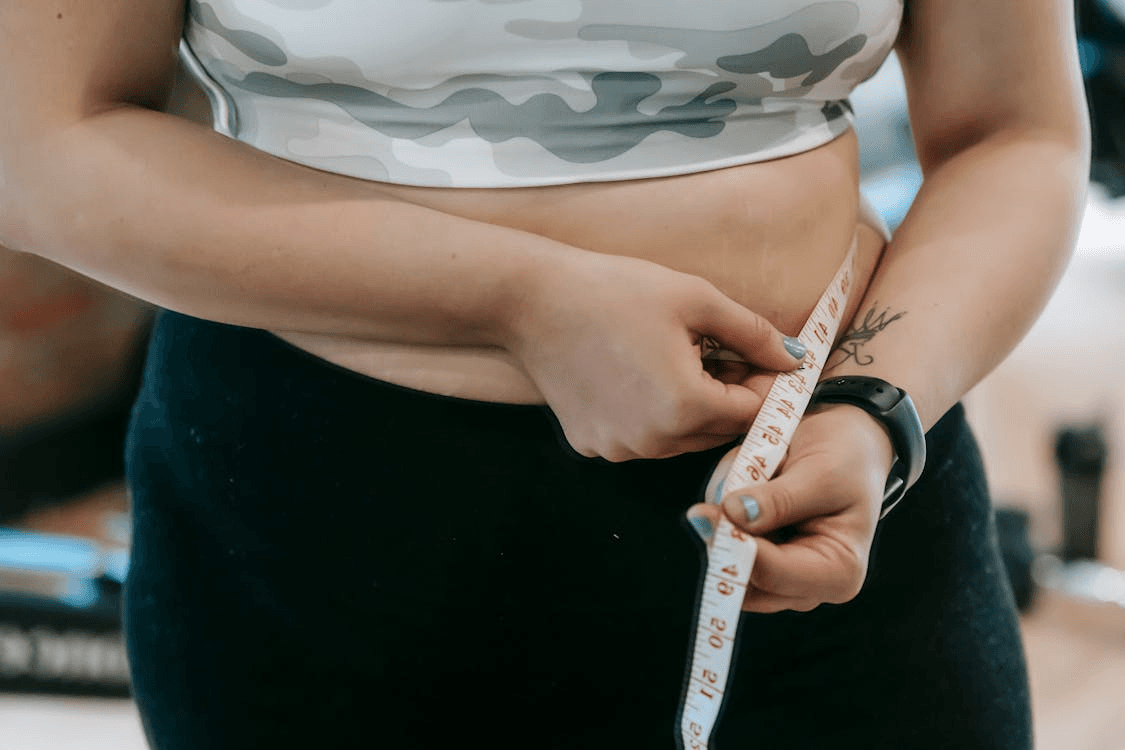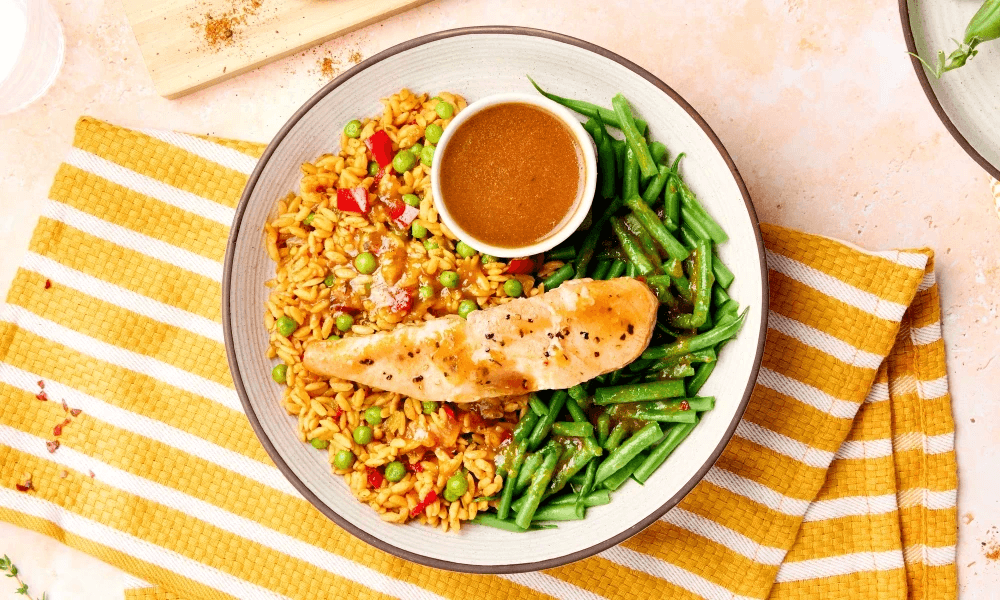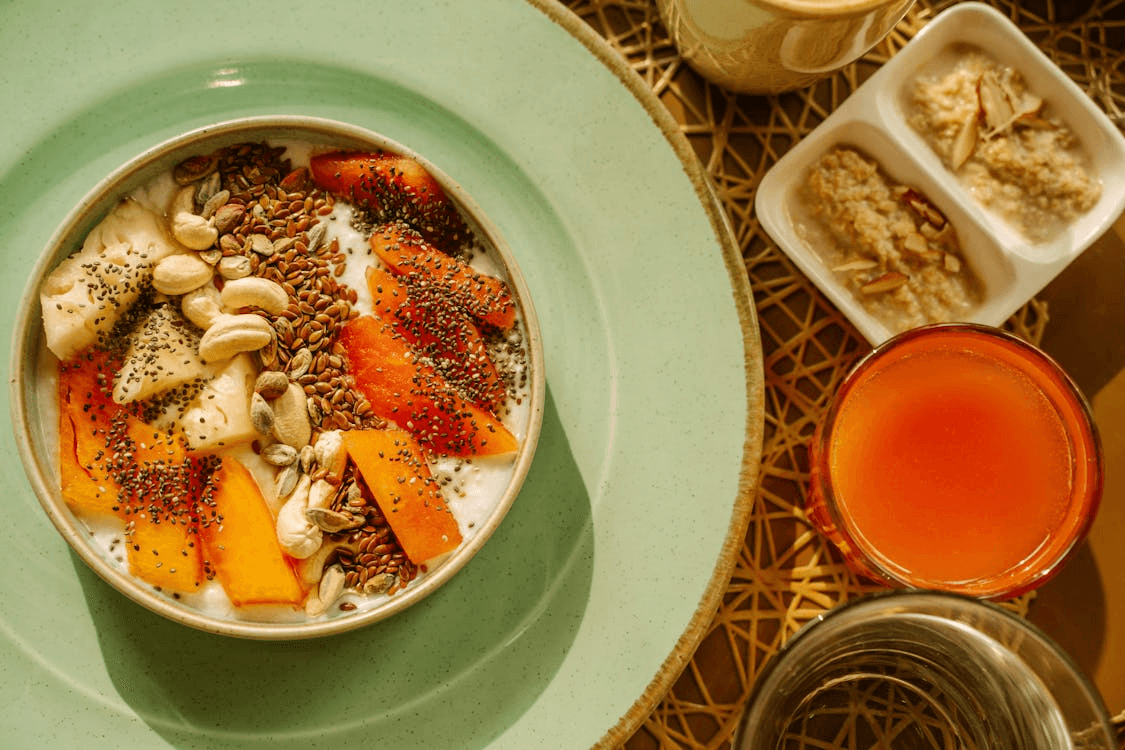World Menopause Day is held every year on October 18th to try and raise awareness of the unique challenges that women face at this time.
This blog is part of our effort to support informed, compassionate conversations around menopause. We’ll be exploring practical, evidence-based ways to help women feel stronger, healthier, well-nourished, and more understood during this important life stage.
“Menopause is not a disease, but it can bring symptoms and health risks that need personalised care.” International Menopause Society
Menopause is more than just a hormonal shift. It’s a full-body recalibration that affects how your metabolism, digestion, sleep, and even your mood function, often in ways that catch women off guard.
Read on to discover how to optimise your menopause diet.

Your diet and menopause: why you need a new strategy
Menopause isn’t about willpower, mindset, or genetics; it’s just biology. However, the way you experience it may be affected by your genes, your lifestyle, and, of course, your diet. The good news is that you don’t need to starve yourself to make a positive difference, just adopt a smarter, more supportive approach to eating. You can support your body through this transition, reduce the severity of symptoms, and feel more in control again simply by making some easy dietary changes.
Before we look at these, it can be helpful to understand a bit more about what you can expect and why it happens.
What is menopause?
Menopause is the term for the phase in life when a woman permanently stops having menstrual periods. It occurs because the ovaries stop producing eggs and the hormones oestrogen and progesterone. This change typically occurs between the ages of 45 and 55, and can cause symptoms like hot flushes, mood changes, and night sweats. These symptoms may begin before menopause actually occurs, in a phase called perimenopause. Pre, during, and post-menopause, the drop in oestrogen negatively affects metabolism, mood, bones and cardiovascular health, and this may result in a myriad of different symptoms [1,2] including:
- Hot flushes
- Difficulty sleeping
- Night sweats
- Headaches
- Muscle aches and joint pains
- Weight gain and change of body shape
- Loss of libido
- Vaginal dryness or discomfort during sex

Best diet for menopause
Food alone won’t “fix” menopause, but it can make a profound difference. Research has identified a connection between diet and menopause symptoms [3,4].
The best time to eat for the menopause is before it starts, as diet-induced changes don’t happen overnight, but it’s never too late to optimise your meals. Menopause isn’t a time for trying fad diets. It’s a time to make a long-term, positive shift toward meals that stabilise blood sugar, support hormone balance, weight, and metabolism, to keep you full, nourished, healthy, and energised during menopause and beyond.
Even if you've always eaten a healthy diet, your regimen may still need a tweak or two. There are some unique physical challenges that women face at this time, such as a change in metabolism leading to unexpected weight gain.
Diet for menopause weight gain
Around this time of life, there can be a difficult dietary adjustment for many women, as their basal metabolism changes dramatically. Changes in hormone levels can make women’s bodies begin to store, rather than burn, the calories they eat. Typically, during and after this phase of life, a woman needs around 300 fewer calories per day. This is why you often hear women saying, “ I just can’t lose weight despite dieting and exercise!” during and after the menopause.
As part of this change, you may notice:
- You gain weight more easily, especially around the middle
- You feel hungrier but less satisfied after meals

- Energy crashes and sugar cravings hit harder
- Sleep is disrupted, and recovery feels slower, so you might feel fatigued
Whilst it is possible to counteract this natural physiological effect by reducing food intake, counting calories, and increasing exercise, it’s worth taking a balanced view. After menopause, carrying an extra pound or two may even be helpful. Once the ovaries stop producing oestrogen, fat cells become a source of oestrogen, which can help to support bone health [5,6]. However, carrying too much weight, especially around the abdomen, is not advisable, as obesity is associated with a variety of serious health risks.
Read our top diet and exercise tips for cutting belly fat
Menopause and diet pills
During menopause, some women consider weight-loss medications like Ozempic (semaglutide) or Mounjaro (tirzepatide) to manage hormonal weight gain. While these drugs can be effective, common side effects [7] such as nausea, fatigue, and gastrointestinal discomfort can compound menopause symptoms such as hot flushes, sleep disturbances, and mood changes. Additionally, rapid weight loss may increase the risk of muscle and bone loss - already a concern post-menopause due to declining oestrogen levels. These medications should only be used under medical supervision, where the benefits of the drugs to support obesity offset potential risks.
Read more about eating healthily while taking Ozempic.

If you are struggling to lose weight at any time in life, first speak to your doctor to ensure that there are no underlying medical causes and to discuss the best strategies for managing your weight. Eating a balanced, healthy diet is always a safe option; however, it’s worth trying this before reaching for diet medications.
Menopause diet plan
A few key foods and food groups can help to offer you all-around support, to keep blood sugar stable and prevent mood swings; promote satiety and support a healthy weight, preserve muscle mass, and maintain hormone balance. You need this to be a healthy eating plan that you look forward to eating during the menopause and beyond.
To keep things simple, I’ve identified five key food groups you should consider to be a priority in your menopause diet:
1. Protein-rich foods
Why: Protein helps regulate blood sugar and mood, supports satiety and weight stability, and protects against age-related muscle loss (sarcopenia). Adequate protein is vital for skin, immune function and recovery too. As we age, protein turnover declines, and our needs actually increase - research [8,9] suggests that older adults should aim for around 1.2g of protein per kg of body weight daily. Low protein intake, especially when combined with low activity levels, can accelerate muscle loss and impact healing, strength, and resilience.
Try: Include 20-30g of protein at each meal from foods like eggs, Greek yoghurt, lentils, beans, fish, poultry, or tofu.
Find out more about how protein can help you maintain a healthy weight, during and after menopause, in our blog: Does protein help you lose weight?

2. Healthy fats
Why: Omega-3 essential fatty acids help to reduce inflammation, support brain and heart health, and may ease mood swings, brain fog and joint pain. Healthy fats also help balance hormones, as well as support mood, cognitive clarity and heart health [10].
Try: Eat two portions of oily fish per week. If you prefer plant-based sources, use flaxseed, chia, hemp seeds and walnuts.
3. Magnesium-rich foods
Why: Magnesium supports healthy bone mineralisation, sleep, mood balance, bowel regularity, and thyroid health. It also plays a role in blood sugar control, helping reduce dips in energy and irritability, and may help with migraine symptoms. Research shows that magnesium levels often drop in women during and after menopause, and this can be linked to thyroid issues, which become more common at this stage of life. Getting enough magnesium may help support your thyroid, improve sleep, and ease symptoms like anxiety or muscle cramps [11,12].
Try: Add pumpkin seeds, leafy greens, whole grains, beans, avocado or a couple of squares of dark chocolate to your daily diet.

4. Soy and Flaxseed
Why: Both provide phytoestrogens, plant compounds that mimic oestrogen in the body and may help to balance hormones. Flaxseed also supports gut health with its fibre content and contains essential omega-3 healthy fats. Japanese women have historically reported fewer menopausal symptoms, such as hot flushes, and this fact has been partly attributed to their higher dietary intake of soya-based foods rich in isoflavones. [13]
Try: Aim for 1-2 servings of soy foods (tofu, tempeh, miso, edamame) daily, plus 1-2 tablespoons of freshly ground flaxseed in porridge, yoghurt or smoothies.
5. Gut-loving foods: fibre and fermented
Why: A healthy gut microbiome supports weight management, hormone balance, inflammation control, and even mental health. Fermented foods provide beneficial bacteria to keep your gut ecology diverse and resilient. Fibre helps to feed your gut microbiome. It also binds to excess hormones and stops them from being absorbed, and keeps you full, helping to prevent weight gain. Research suggests that prioritising gut health could be an important factor in helping to manage symptoms of menopause. [14]
Try: Include a daily portion of live yoghurt with your breakfast, kefir, kimchi, sauerkraut, try miso paste as a spread on toast or as a warm drink, and swap your usual fizzy drinks for refreshing kombucha. Boost your fibre with whole grains, seeds, nuts, and pulses.

Foods to avoid in menopause
As well as focusing on your top five menopause food groups, be aware that there are some foods which you may want to limit during menopause. Avoid sugary, refined carbohydrates, which can cause blood sugar highs and lows and related mood swings. They’ll also have you reaching for the cookie jar at a time when you’re adjusting to metabolic changes. Caffeine, red wine, spicy dishes and sugary snacks are common triggers for hot flushes and night sweats, while ultra-processed foods full of additives can worsen bloating, anxiety, and affect your sleep.[3,15]
Menopause and mental health
Menopause can be a very stressful and emotional period for women, and mental health issues are common at this time [16]. Diet can help your mental well-being, but ensure you support yourself holistically, encompassing mind, body, and spirit. Be very kind to yourself, and expect to be treated with kindness by others. Talk to friends, family, and your employer if you’re finding it difficult to cope. It's a very individual path - consider keeping a journal of what works for you. Try to think positively about this new change: many women feel liberated post-menopause, especially if they’ve previously struggled with hormone-related conditions. You can say goodbye to birth control and menstruation, and it’s a time to focus on yourself! Set new goals, and try to enjoy the journey.

Hopefully, this article has helped relieve some of the pressure of trying to eat healthily during the menopause. Trendy diets and faddy foods are not viable long-term solutions. With a little education and focus, you can optimise your diet for menopause, and enjoy it too!
If you’re feeling too tired and foggy to plan, shop for, and prepare a healthy, high-protein diet, consider subscribing to a healthy meal prep service like Prep Kitchen.
If you enjoyed this article, you may like to read these other articles on our blog:
- Power of Self-Care
- Protein and Mental Health
- How to get enough protein as a vegetarian
- High-Protein Breakfast Ideas
References:
- ang, J. L., Hodara, E., Sriprasert, I., Shoupe, D., & Stanczyk, F. Z. (2024). Estrogen deficiency in the menopause and the role of hormone therapy: Integrating the findings of basic science research with clinical trials. Menopause, 31(10), 926–939. https://doi.org/10.1097/GME.0000000000002407
- National Health Service. (2023, October 24). Menopause – Symptoms. https://www.nhs.uk/conditions/menopause/symptoms/
- Erdélyi, A., Pálfi, E., Tűű, L., Nas, K., Szűcs, Z., Török, M., Jakab, A., & Várbíró, S. (2023). The importance of nutrition in menopause and perimenopause – A review. Nutrients, 16(1), 27. https://doi.org/10.3390/nu16010027
- Barnard, N. D., Kahleova, H., Holtz, D. N., Znayenko-Miller, T., Sutton, M., Holubkov, R., Zhao, X., Galandi, S., & Setchell, K. D. R. (2023). A dietary intervention for vasomotor symptoms of menopause: A randomized, controlled trial. Menopause, 30(1), 80–87. https://doi.org/10.1097/GME.0000000000002080
- Crepaldi, G., Romanato, G., Tonin, P., & Maggi, S. (2007). Osteoporosis and body composition. Journal of Endocrinological Investigation, 30(6 Suppl), 42–47. PMID: 17721073
- Begic, Z., & Rizvanovic, M. (2021). Bone density and body fat distribution in postmenopausal women. Materia Socio-Medica, 33(1), 41–44. https://doi.org/10.5455/msm.2021.33.41-44
- Wilding, J. P. H., Batterham, R. L., Calanna, S., Davies, M., Van Gaal, L. F., Lingvay, I., McGowan, B. M., Rosenstock, J., Tran, M. T. D., Wadden, T. A., Wharton, S., Yokote, K., Zeuthen, N., & Kushner, R. F. (2021). Once-weekly semaglutide in adults with overweight or obesity. New England Journal of Medicine, 384(11), 989–1002. https://doi.org/10.1056/NEJMoa2032183
- Morris, S., Cater, J. D., Green, M. A., Johnstone, A. M., Brunstrom, J. M., Stevenson, E. J., Williams, E. A., & Corfe, B. M. (2020). Inadequacy of protein intake in older UK adults. Geriatrics, 5(1), 6. https://doi.org/10.3390/geriatrics5010006
- Chernoff, R. (2004). Protein and older adults. Journal of the American College of Nutrition, 23(6 Suppl), 627S–630S. https://doi.org/10.1080/07315724.2004.10719434
- Ko, S. H., & Kim, H. S. (2020). Menopause-associated lipid metabolic disorders and foods beneficial for postmenopausal women. Nutrients, 12(1), 202. https://doi.org/10.3390/nu12010202
- Kolanu, B. R., Vadakedath, S., Boddula, V., & Kandi, V. (2020). Activities of serum magnesium and thyroid hormones in pre-, peri-, and post-menopausal women. Cureus, 12(1), e6554. https://doi.org/10.7759/cureus.6554
- Rondanelli, M., Faliva, M. A., Tartara, A., Gasparri, C., Perna, S., Infantino, V., Riva, A., Petrangolini, G., & Peroni, G. (2021). An update on magnesium and bone health. Biometals, 34(4), 715–736. https://doi.org/10.1007/s10534-021-00305-0
- Nagata, C., Takatsuka, N., Kawakami, N., & Shimizu, H. (2001). Soy product intake and hot flashes in Japanese women: Results from a community-based prospective study. American Journal of Epidemiology, 153(8), 790–793. https://doi.org/10.1093/aje/153.8.790
- Liaquat, M., Minihane, A. M., Vauzour, D., & Pontifex, M. G. (2025). The gut microbiota in menopause: Is there a role for prebiotic and probiotic solutions? Post Reproductive Health, 31(2), 105–114. https://doi.org/10.1177/20533691251340491
- Faubion, S. S., Sood, R., Thielen, J. M., & Shuster, L. T. (2015). Caffeine and menopausal symptoms: What is the association? Menopause, 22(2), 155–158. https://doi.org/10.1097/GME.0000000000000301
- Hendriks, O., McIntyre, J. C., Rose, A. K., Crockett, C., Newson, L., & Saini, P. (2025). The mental health challenges, especially suicidality, experienced by women during perimenopause and menopause: A qualitative study. Women’s Health, 21, 1–13. https://doi.org/10.1177/17455057251338941




